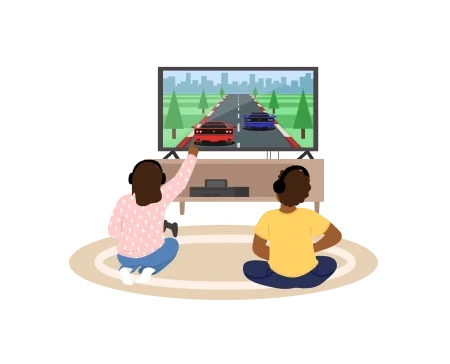Playing Multiplayer Games Online
Make sure your kids’ online multiplayer experiences are appropriate with these tips.

Many popular games can be played online with other players. Most of those games allow you to choose with whom to play but in many cases your child may be playing with others they don’t know in real life. There are numerous measures you and your child can take to help ensure that online gameplay stays positive, fun, and safe, including:
- Know who’s on the other side of the conversation. Start by limiting your kids’ online gameplay and communication to friends from school, extracurriculars, and other activities to ensure that your kids feel safe and comfortable playing online. It’s a good idea to periodically review your child’s online friends list to make sure you know with whom they’re playing online. Parental controls on your child’s game device (or the device’s mobile app) can help you manage their online communications.
- Review the terms of service and community guidelines. Game companies and platforms have rules about what can and cannot be said or done while playing online. These also explain when it may be appropriate to take measures against other players that are behaving inappropriately. Reviewing a game’s community guidelines or code of conduct with your child may also be a great way to reinforce what is and isn’t acceptable behavior online.
- Block, mute, and report. Most online games and platforms empower players to block or mute others who are behaving in a manner that you and/or your kids find inappropriate. Muting allows players to continue to play together without communicating verbally, while blocking or “unfriending” another player makes it so you do not have to play with them at all. It’s important to remember that the vast majority of people who play video games online want the same thing: To have fun and share a game together! That said, as with other forms of social media, your kids may encounter another user harassing or bullying others in a manner that is unacceptable. For these situations – in addition to muting and blocking – you can “report” them using the in-game or platform’s tools or following the instructions provided, which may result in their suspension or ban if they are violating the game’s terms of service or community guidelines.
- Keep the conversation positive and ongoing. Empowering your kids to come to you with both the fun and not-so-fun aspects of their game experiences is the single best tool you have. Many kids feel as though they will get in trouble or have their game time suspended if they flag a troubling situation or user to their parents. Help your kids understand that they can always go to you if they don’t know how to approach a situation, which also means keeping the conversation about games in general a positive and fun one. Playing games together as a family can help too.
- The golden rule. Some people forget that there are human beings on the other side of the screen. Just like in real life, bullying is unacceptable and can cause serious, lasting distress. It can be helpful to discuss these situations with your kids, so they know what your expectations are when it comes to treating others. Respect goes both ways.
Most publishers of online video games monitor and moderate communications between players to help enforce compliance with their community guidelines. As industry leaders, Nintendo, PlayStation, and Xbox have all aligned on a common set of principles that prioritize protecting the safety of players, especially those most vulnerable.
 Selecting Appropriate Video Games
Selecting Appropriate Video Games  Establishing Household Rules
Establishing Household Rules  Child Accounts and Parental Controls
Child Accounts and Parental Controls  Managing Screen Time
Managing Screen Time  Privacy Tips For Parents
Privacy Tips For Parents